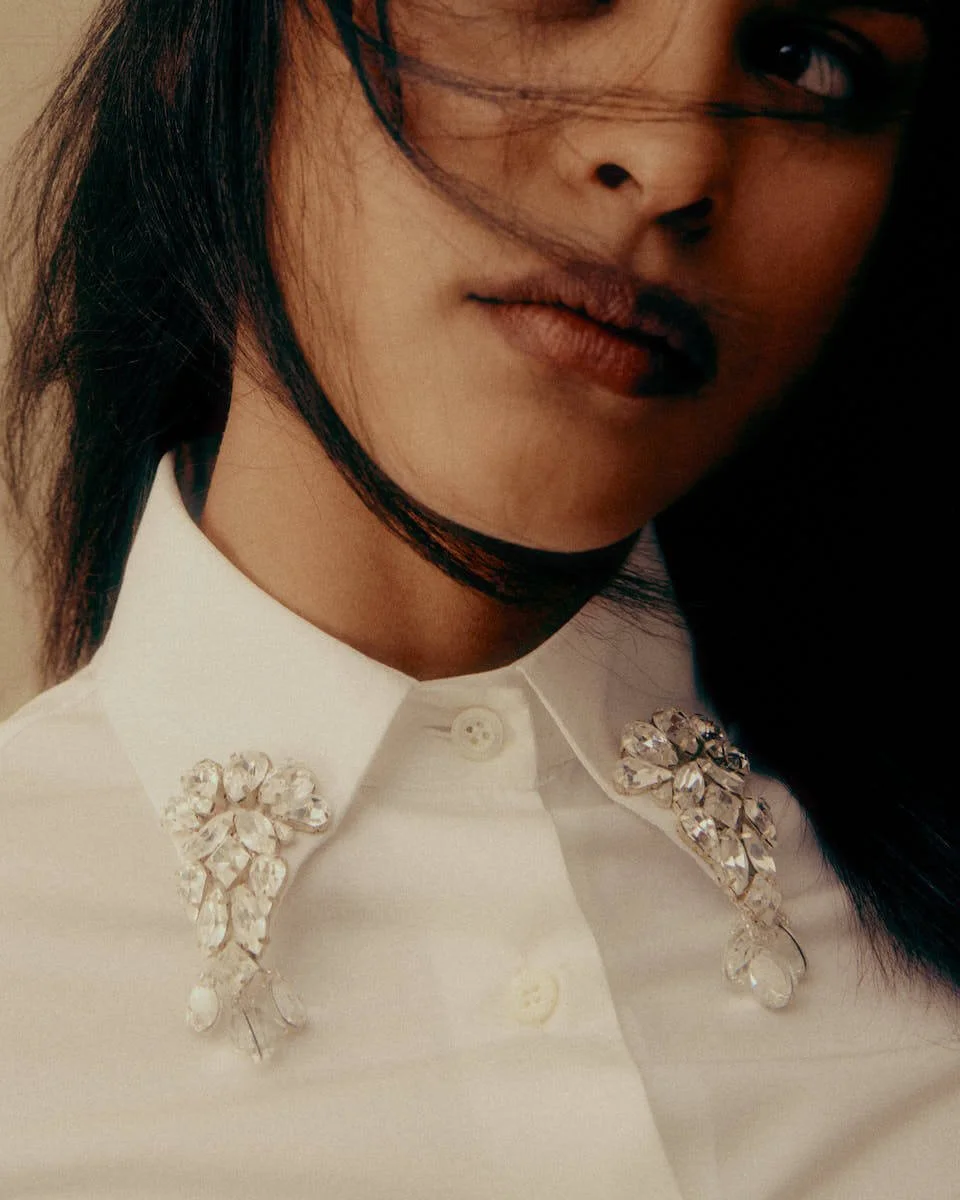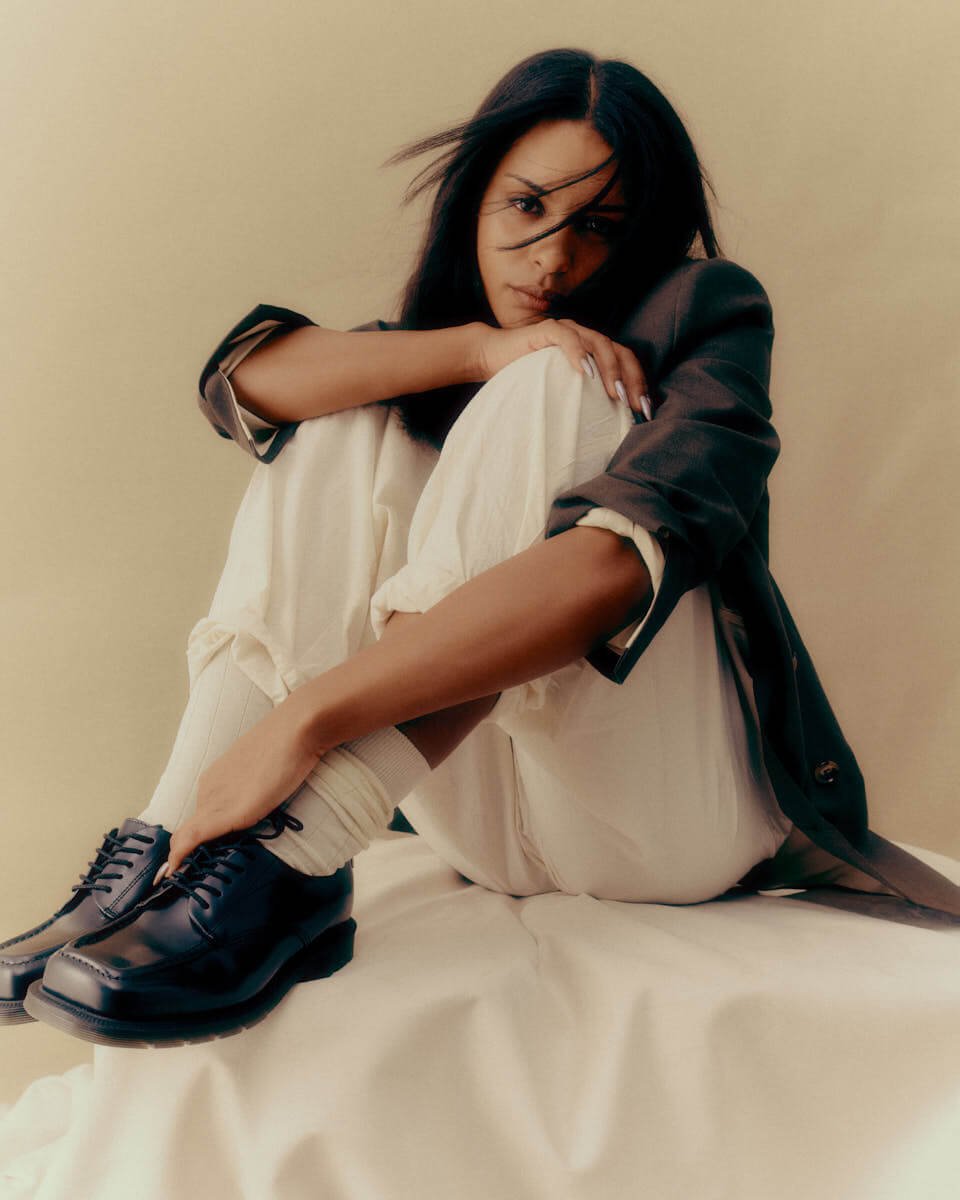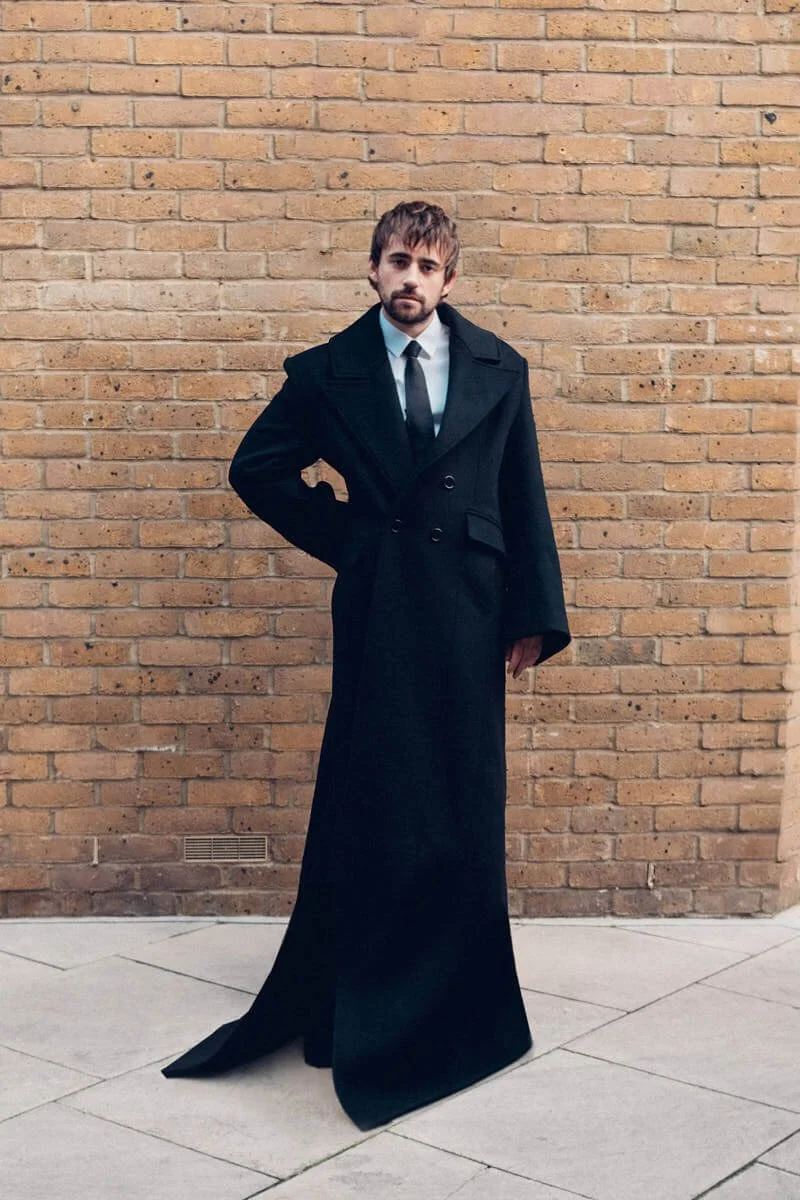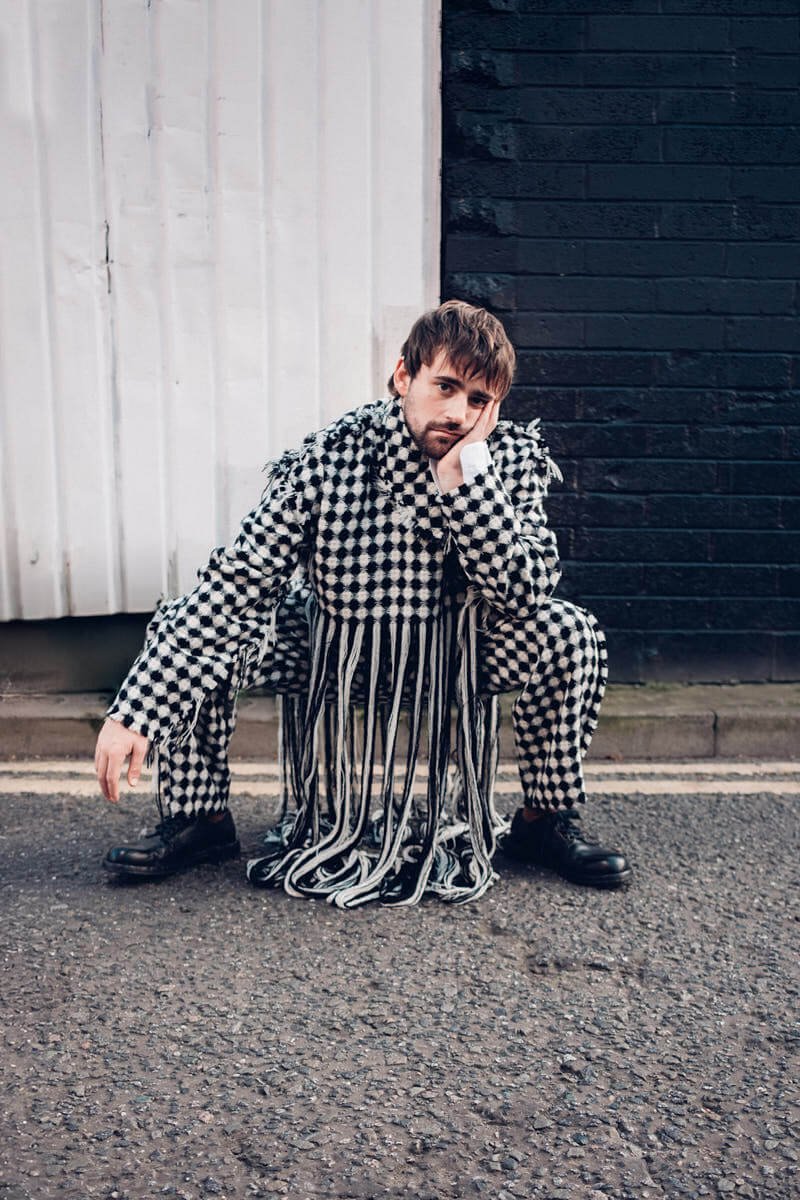.aesthetic talk
The Multifaceted Prism of
KYSHAN WILSON
written + interview Chidozie Obasi
When it comes to a grounded star quality, many can only dream of having the determination, skill and poise possessed by Kyshan Claire Wilson.
After her noteworthy appearance in the acclaimed fiction Mare Fuori, the rising talent has made herself between the allusive streets of East London and Naples. But, while a domination of one of the world’s most coveted industries would be a career-high for some, it’s not what the multi-faceted actress plans on seeking for just yet: from moments of doubt to gushes of thrill, the actress began to exceed her own expectations and transcend career boundaries on her own terms, cementing her as a rising star worthy of the name.
total look LOUIS VUITTON
TEAM CREDITS
seen NICOLÒ PARSENZIANI
fashion director + stylist CHIDOZIE OBASI
head of production JESSICA LOVATO
fashion coordinator DAVIDE BELOTTI
grooming CRISTINA CROSARA via THE GREEN APPLE ITALIA
set design IRENE COVERI
video VALENTINA GILARDONI
digital EDOARDO MONTACCINI
talent KYSHAN WILSON via WHYNOT MODELS
light assistant GIUSEPPE PALAZZOLO
production assistant ANJA MENEGON
fashion assistants ISABELLA PETROCCHI + LILLY PADILLA + VALENTINA VURCHIO
blazer ACN N1
shirt GRIFONI
top + shorts SANDRO
pants ALBERTA FERRETTI
bracelets DOLCE & GABBANA
loafers CHURCH’S
“I'm a black woman, I’m perceived by the world as a black woman and I identify as one. But I'm not going to act like I'm not aware of my mixed privilege, being mixed.”
Kyshan Wilson speaks with Chidozie Obasi
for LE MILE .Digital
total look LORO PIANA
total look PRADA
watch film
filmed VALENTINA GILARDONI
film assistant LUCA ZITO
“Both professionally and personally, I've been on sets that have inspired me a lot artistically,” she says, the moment we begin to settle into our conversation. “I've been around people that have made me more driven, but I've always been ambitious.” However, in an industry where saturation is increasingly commonplace, there are moments able to hit one’s stride with troubled force. “There are times when you get less auditions, and that ambition doesn't go away, but it can drift in and out. This year, I've met people that have really lit that fire in me again, so I'm really grateful.”
Wilson’s first memory of film has been the experience of viewing an eclectic array of products both on TV and in cinema. “I've always loved being able to live someone else's life, whether that be for an hour or three,” she reminisces. “I've always loved the kind of escape from reality, which can sound bleak, but it was always that for me.”
Wilson recalls having this dream that didn't feel tangible while growing up, not being part of the industry’s nepotism and without connections. “It almost felt that it wasn't the path set out for me,” she explains. As a kid, she forced everyone in her family to watch hour-long shows, which helped her to unleash her inner potential. “The first time I realised that this could be a career was with Mare Fuori, when I started the auditioning process which kind of came out of nowhere,” she opines. “It was this surreal, emotional moment where all of little Ky's dreams were coming true.”
As a woman of great poise, Wilson credits her mother as a main source of inspiration throughout her life. “She was and still is a single mum, and the strength she had to move us into a different country all on her own while always providing on her own has definitely been the biggest element that makes her a role model,” she says, explaining how “she'd be surprised to hear this.” Wilson deems her entire family an anchor. “They’re not afraid to tell me when I'm doing too much or how privileged I am to be in my position at times, and I think that's very important to have people that stabilise you.”
jacket FENDI
shirt BLAZE MILANO
skirt FERRAGAMO
necklace ILENIA CORTI
blazer PHILOSOPHY di LORENZO SERAFINI
pants MARK KENLY DOMINO TAN
socks PAUL SMITH
shoes DR MARTENS
“I want to be a Bond girl! Maybe if I put it into the universe, it will come to fruition.”
Kyshan Wilson speaks with Chidozie Obasi
for LE MILE .Digital
coat PAUL SMITH
sweater AVANT TOI
shirt AVIU
skirts VIVETTA
jewels DOLCE & GABBANA
coat + tights JIL SANDER by LUCIE & LUKE MEIER
top FERRAGAMO
skirt AVIU
shoes DOLCE & GABBANA
When speaking on her role in the fiction Mare Fuori, Wilson—named Kubra in the series—speaks frankly about the impact and the relevance her role had in relation to the broader context of the script, which portrayed her as the daughter of a troubled prostitute harassed by male toxicity. “I find this really interesting because my thoughts on Kubra specifically, in Mare Fuori, aren't maybe what you would expect, because the fiction is recounting the story of a group of teenagers in a juvenile prison,” she says. “So I think given that context, for me as an actress, it felt less frustrating and jarring because all of our characters have done terrible things to end up in a juvenile prison.”
Most of the characters came from hard, tough backgrounds, and it’s exactly the reason why her role “didn't feel like the classic stereotypical black actor cliche, where there’s a tendency to cast only poc in degrading roles.” She didn’t feel it was as harsh as other roles in the film industry at large. “There are roles I've played where I’ve definitely felt more pigeonholed, but I think given the context (again, of a prison), I didn't really expect anything less than that.” Wilson took that as a challenge and made Kubra a profound and complicated character that wasn't defined solely by those stereotypical black traits. “I tried to make the best out of it and make her as layered as possible to show the intelligent and funny and human and vulnerable side to her, not just the angry black woman kind of cliche.”
Leaning on representation and the importance of inclusion, in an industry that often exacerbates the state of it at the expense of white privilege, she speaks with unguarded honesty. “I think there's a desperate need to work on representation, especially in Italy, and to be clear I talk about Italian cinema and TV because that's my experience,” she says. “When I talk about more representation, I talk about working on representation. It means not only we don't want roles that are defined by the way white people perceive Blackness, but I also refer to the process of recycling roles intended and written originally for white people, already played by white people, and given to black people as a token.” Wilson deems these attempts “lazy,” and she’d rather see people “invest time, money, invest effort and writers into creating and curating our own stories; stories that take into consideration the black experience, without making it a cliche.” Additionally, Wilson thinks that “sometimes it’s done well and is cool, but most the time feels cheap”
So I cannot help but wonder: how does an actress with such depth and sensitive line of thought perceive otherness and colourism? “I'm a black woman, I’m perceived by the world as a black woman and I identify as one. But I'm not going to act like I'm not aware of my mixed privilege, being mixed,” she freely admits. “I have softer hair and European features, and I'm not going to deny that I believe that has had a positive impact on my career.”
total look SPORTMAX
dress VERSACE
Moving on to softer ground, I ask about the roles she’s cherished the most. “I love Aura in Those About to Die,” she says. “I think there's a lot to play around with, and I think if we get the opportunity to proceed with another series there would be a lot to dive into within her psyche. I love her strength, not in the classic way we see strong characters - but a strength that lies within her vulnerability.” The series explores an unveiled side of Rome: the dirty business of entertaining the masses through blood and sport. “She’s vulnerable, as she's sold into slavery but she's still the rock for her sibling and her mother, and her maternal figure leans on her a lot,” she says. “I love the parallels of strength and vulnerability, particularly when those two things can co-exist because I don't like flat characters and no one wants to see.”
And, if that wasn’t enough, between ensuring that her passion for acting never fades and that her diary is never empty, Wilson is well engaged in the fashion scene. “Fashion is art and it’s expression, and I love any form of art and expression,” she opines. “I'm a very creative person and I'm drawn to cinema, fashion, paintings and any art.
So I love any opportunity I get to be a part of this world: we work very hard with both my fashion modelling agency, WhyNot, and my cinematic agency, Karasciò, to intertwine all projects and make sure that I have the opportunity to be at events, but also so that doesn't get in the way of sets. And they're very good at accommodating each other and me and making it all work.”
What does she hope for the years to come? “To still be doing what I love, which is acting,” she says, her head nodding with excitement. “I also hope to be living in another city, as I love moving around, and I definitely want to slowly emerge into the international world of cinema and TV.”
We’re way past our allotted interview time, and as the end-of-year holidays are fast approaching it’s apt to muse over Wilson’s new year resolutions. “I want to be a Bond girl!” she wildly chuckles, as we wrap up our conversation. “Maybe if I put it into the universe, it will come to fruition. But on a serious note, I just hope to keep doing things to make me fall more in love with my craft, becoming better at it.” And, just like Wilson, I very much hope the same.




























